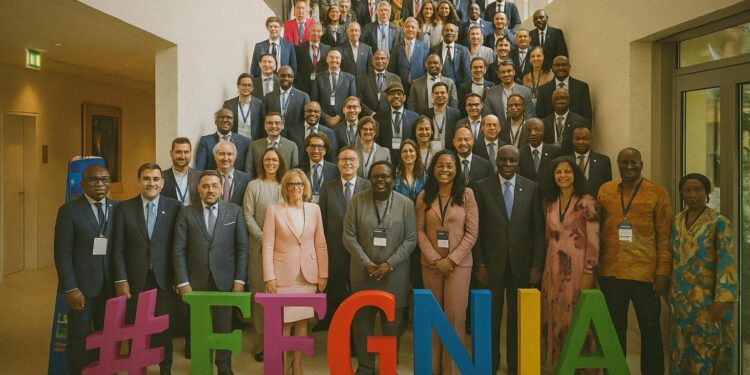Diplomatic Overture in Geneva Sets the Tone
The marble corridors of the Palais des Nations seldom resonate with a distinctly African digital agenda, yet the recent World Summit on the Information Society Forum made room for it. Flanked by ministers from francophone Africa and representatives of the International Telecommunication Union, Congo-Brazzaville’s delegation introduced Luc Missidimbazi’s bid for the helm of the African Telecommunications Union for the 2026-2030 term. In a carefully calibrated address, the candidate framed the moment as “a test of collective continental leadership,” linking universal connectivity to the imperatives of sovereignty and social cohesion (Missidimbazi, 2024). Geneva thus became more than a venue; it served as the launch pad for a regional bid with global echoes.
A Candidate Rooted in Brazzaville’s Digital Agenda
Missidimbazi’s résumé interweaves public advisory roles and private-sector entrepreneurship. As senior adviser on posts and electronic communications to Prime Minister Anatole Collinet Makosso, he has been a principal architect of Congo’s 2021–2025 Digital Strategy, which prioritises fibre-optic corridors, domestic cloud infrastructure and technology incubation hubs. His stewardship of the OSIANE fair, now one of Central Africa’s largest tech showcases, has introduced Brazzaville to investors from Casablanca to Shenzhen, reinforcing the city’s aspiration to act as a regional gateway for data flows (UNECA 2023).
By putting forward a figure who blends technical proficiency with diplomatic agility, Brazzaville signals continuity with President Denis Sassou Nguesso’s broader modernisation agenda, itself anchored in the diversification of an economy historically reliant on hydrocarbons. Analysts in Abidjan and Addis Ababa view the nomination as a bid to translate national know-how into continental influence without challenging existing power balances inside the AU ecosystem.
Telecommunications Governance at a Continental Crossroads
The African Telecommunications Union, founded in 1977, finds itself negotiating rapid shifts: the commercial rollout of 5G, the proliferation of low-earth-orbit satellite constellations and intensifying cyber-security threats. Recent ATU communiqués underline the need to harmonise spectrum management and data-protection norms in order to prevent the fragmentation of Africa’s digital single market (ATU 2024). In this context, Missidimbazi’s manifesto emphasises agility and inclusivity—terms that resonate with smaller member states eager for a louder voice in negotiations with global equipment vendors.
Observers trace the urgency back to the pandemic, which exposed gaps in cross-border broadband infrastructure. The Economic Commission for Africa estimates that less than 35 percent of Africans enjoy reliable internet access, compared with 89 percent in Europe. Bridging that divide requires not only capital but also a concert of regulatory frameworks; the UAT secretary-general wields influence precisely at that junction.
Balancing Sovereignty and Connectivity
During a side event in Geneva, Missidimbazi argued that African nations must avoid a binary choice between cyber-sovereignty and open innovation. Citing the recent Malabo Convention on Cyber Security and Personal Data Protection, he proposed a graduated approach that strengthens indigenous cloud services while keeping Africa embedded in multilateral standard-setting bodies (ITU 2024). Diplomats from Rwanda and Egypt reportedly welcomed the stance as a middle path capable of attracting foreign direct investment without relinquishing control over critical data assets.
Congo’s domestic experience lends credence to this discourse. The government’s partnership with regional operators has already delivered the ‘Backbone National’ fibre ring linking Pointe-Noire and Ouesso, cutting latency for inland neighbours such as the Central African Republic. Brazzaville’s model therefore offers a tangible case study for Missidimbazi’s continental ambitions.
The Road to Dakar and Beyond
Momentum is now shifting toward Dakar, host of the ATU Council in May 2025, where ballots will be informally counted even before the official election slated for 2026. In the corridors of the King Fahd Palace Hotel, envoys recall the unwritten rule that linguistic and regional balance shapes most appointments. Congo’s francophone identity could thus complement the outgoing anglophone leadership, a factor that Nairobi-based think-tank AFRICTA deems “politically palatable across fault lines” (AFRICTA 2024).
Still, Brazzaville must convert polite applause into formal endorsements. South Africa’s regulatory authority has floated an alternative candidacy, while East African states weigh alignment with their fast-growing fibre consortia. Missidimbazi’s camp, conscious of these undercurrents, has scheduled consultation missions in Pretoria, Lagos and Addis Ababa to secure the requisite two-thirds majority. Sources close to the AU Commission note that Congo’s diplomatic capital, accrued through its mediation in regional security dossiers, may tip the balance.
The candidate, for his part, concludes every intervention with the same refrain: “Africa wins united.” In Geneva it sounded aspirational; by Dakar it must become arithmetic. For Congo-Brazzaville, the quest is more than an individual’s campaign. It is a strategic wager that leadership in telecommunications governance will amplify the country’s voice in broader continental deliberations on climate finance, trade facilitation and peacebuilding. Should the bid prevail, Brazzaville would not simply celebrate a national triumph; it would occupy a fulcrum from which Africa negotiates its digital future on the world stage.












































